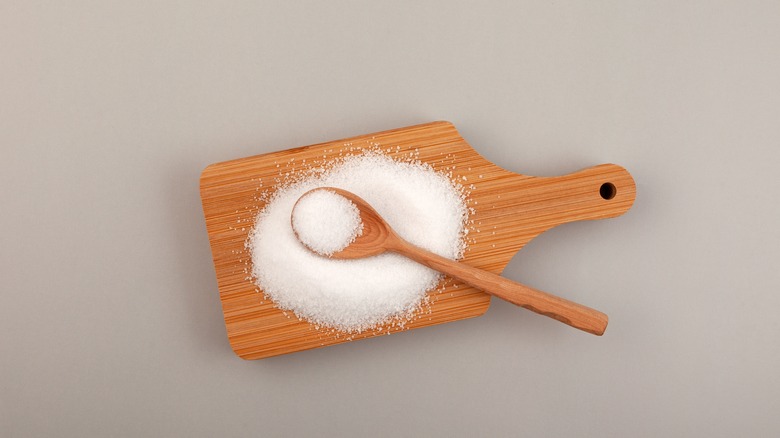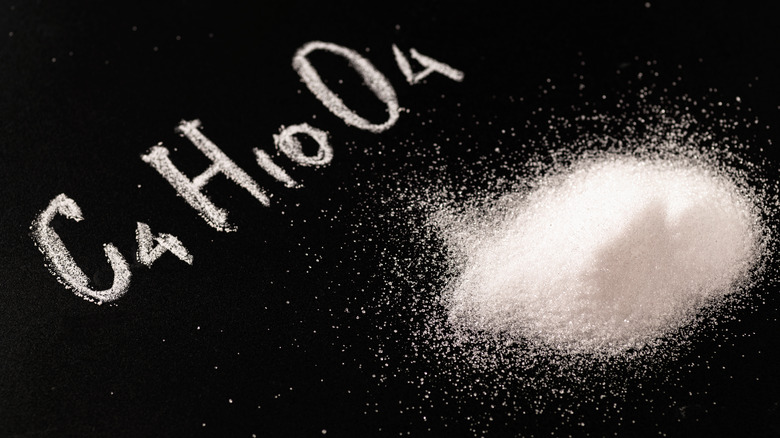What Are Sugar Alcohols, And Are They A Safe Substitute?
Erythritol, sorbitol, xylitol. You might recognize these words on the back label of that cereal box, keto snack, or pint of ice cream that you pick up at the grocery store. As more and more people have become health-conscious over the years, sugar substitutes have flooded the food industry — popping up on ingredient labels everywhere.
Sugar substitutes aren't new, but they're becoming more prevalent in the foods we eat, and it can be confusing to keep them all straight. We all know about artificial sweeteners like Splenda, and the more recently popular natural sweeteners like Stevia. Today, you'll find sugar alcohols everywhere.
Sugar alcohols are commonly used as a healthier alternative to sugar to sweeten processed foods, from chewing gum and energy bars to ice cream and baked goods. But what are they, exactly? Are they natural or artificial, and are they better or worse for you than the sugar they're replacing? Here's everything you need to know.
Sugar alcohol: not a sugar, not an alcohol
The first thing to understand about sugar alcohols is that they aren't at all what they sound like. To get a bit scientific, they're called sugar alcohols because their chemical structure resembles both sugar and alcohol — but that doesn't mean they contain sugar or alcohol. Sugar alcohols (or polyols) are actually plant carbohydrates that happen to mimic sugar's chemical structure and sweet taste.
There are eight types of sugar alcohols currently approved for our consumption that the food industry uses as sugar substitutes in many "low carb" or "sugar-free" foods. If you see something on the label that ends in "-tol", chances are it's a type of sugar alcohol. Some, like mannitol, xylitol, and sorbitol, are found naturally in many whole foods like fruits, vegetables, and cereals. Others are produced synthetically and added to processed foods. Sugar alcohols are anywhere from 30-90% as sweet as regular sugar, but they have around one-third to one-half the amount of calories.
"Sugar alcohols stimulate the tongue's sweet taste buds, which adds flavor without extra sugar or calories," registered dietician Tegan Bissell explains to Cleveland Clinic. They essentially look and taste like sugar, but are widely considered to be a healthier option than real sugar. The question is, how safe are they?
Are sugar alcohols safe to consume?
Like so many complicated foods and ingredients, the answer to this question is both yes and no. There are several known benefits of sugar alcohols that make these ingredients a healthier alternative to sugar: they have fewer calories and carbs, they don't spike your blood sugar in the way that real sugar does, and they don't cause tooth decay. But like real sugar, consuming sugar alcohol also comes with some negatives. The biggest issue is that our bodies aren't able to fully absorb or digest sugar alcohols, which causes gastrointestinal problems like bloating or diarrhea.
Regardless of pros and cons, the overall safety of sugar alcohols is more questionable now due to recent research. For example, one study found that erythritol can increase the risk of cardiovascular events — so if one type of sugar alcohol isn't as safe as it was originally believed to be, there may be cause for concern over the others. The bottom line is that these are newer ingredients in the food industry, and more research is needed to determine just how safe they are for our bodies.
While they do offer certain benefits when compared to real sugar, until we have the long-term research we need, it's best to consume sugar alcohols in moderation to be on the safe side.


